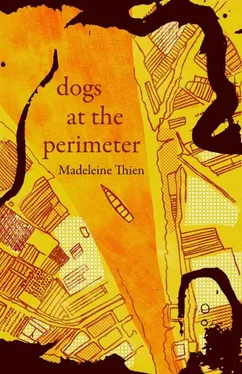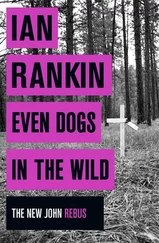In the morning, a thunderstorm came, threads of lightning connecting the earth to the clouds. When Hiroji went into town for supplies, James and I sat outside in the diffuse, changing light. A woman brought us coffee and sat with us. She was Khmer and we began speaking, in tangents and in drifting conversations, and eventually James, too, began to speak. The days and nights we remembered began to overlap. Afterwards, and in the days that followed, I wrote so many things. I did not know what I was making. Terrible dreams came, but I tried to let them run through me and reach the ground. I saw that they would always return, this was the shape of my life, this was where the contours lay, this was the form. Yet I wanted, finally, to be the one to describe it. To decide on the dreams that took root in me.
As I work, my son comes to me in my memory. Kiri names the rivers for me just as I once taught him: St. Lawrence, Fraser, Kootenay, Mackenzie, Yukon, Chaudière, Assiniboine . Words to keep him company, to name the world, to contain it.

Monday, February 27
[fragment]
The hills are a fading purple, already the colour of dusk. James Matsui knows these mountains well, they are visible from Phnom Penh, the capital of Cambodia, a once-elegant city that now sleeps with one eye open, like Cain dreaming of Abel. In October 1974, on a night when trails of mortar fire glint in the southern skies, James writes the last letter that he will send to his family in Canada. He takes the envelope to the Red Cross office and then he detours beside the river, the Tonle Sap. He is lost in the crowd. Couples brush past him holding hands, children strut along the boulevard, tall as peacocks, parading past the throng of beggars. They and he are surreal in the evening light, dissolving in and out of focus, strolling to the rhythmic boom of artillery fire. Around him, people giggle in response to the shelling, maybe to prove they aren’t afraid, or maybe because the long war has made everyone careless or shameless or easily amused. On the boulevard, young swindlers in military uniforms stop the traffic. He doesn’t like the look of them, not when the stinking, starving man letting them pass is their grandfather’s age, not when beggar boys swarm at their feet waiting for treasure. He can’t abide their rifles and their ammunition belts, their cheap, flagrant uniforms. This is a city about to fall.
That night he works the midnight shift at the refugee camp and in the morning, his driver delivers him home to bed. Sorya is there, in her slippers, twisting the radio dial back and forth, catching mostly static.
They married a year ago. Sorya’s brother, Dararith, had been a Red Cross doctor, a Cambodian doctor (James is in the habit of differentiating, and he finds it hard to break this habit). Sometimes the three of them would stay up late talking about the war, about movies and tv shows and rock music. Dararith was an average doctor but a brilliant singer. He used to serenade them on those long nights when they bunkered down to wait out the shelling. James and Sorya get by in Khmer and crusts of French and English. She is well read and polite and funny, but sometimes, lately, for split seconds, he knows that she wants to hit him, or fling something heavy at him. For his carelessness, the way the war no longer touches him. Sometimes he comes to bed and wonders why she’s there, what she wants from him, why she keeps her eyes closed when they have sex, why she makes him come so hard and almost bitterly, and then she rolls out from under him and leaves the room so that he falls asleep to his own solitary breathing. It’s this ridiculous war that drags on and on and gradually covers everyone in dust so that, in the end, it would be just a small step to crumble like the stone buildings and the once-paved roads, to accept the degradation.
The Red Cross had sent him to Saigon in 1971 but he couldn’t abide the depressed, strung-out Americans. His superiors said, Well, try Cambodia, so up the river he went, a boy on a barge looking for better company. And it was better for a while, especially when Dararith was here. Phnom Penh wasn’t as frenetic, it wasn’t so obviously a lost cause. But what was once intoxicating to him is now dreary, Phnom Penh is catching up to Saigon. The end is near and everyone who doesn’t know it is either a diplomat or a king. The barbarians are at the gates with their rubber sandals and their Chinese-made rockets and it’s useless now, worrying over the bombing runs, legal or illegal, even though he sees the damage every day, thousands crawling into the city with missing limbs and missing children, people mutilated by the Khmer Rouge or bombed into hysteria by the Americans. They appear like wraiths. He knows men who have thrown themselves into the Tonle Bati, even Dararith used to joke about it. Nothing changes, he used to say. We’re caught in an infinite war.
But he, James, is living off the fat of the land: a noble Red Cross doctor healing children who will be pushed to the front lines tomorrow, boys who, day by day, are learning to revel in their worst tendencies. Tomorrow, he could be in Bangkok. Today there was an old woman eating the bark off a tree, stripping ribbons from it the way his mother used to de-vein the celery stalks, and he didn’t have the energy to go home and fetch this old woman some sugar and chocolate, something from his magnificent store of abandoned goods, bequeathed to him by the fickle bureaucrats, expatriates, and socialites leaving Phnom Penh en masse. What would his mother say? She saw the war in Tokyo. She saw much worse than this. The black dust covers everyone, even the healers. Physician, heal thy self , but what he wants is to sleep for days on end and wake up in a tropical paradise where a compassionate Buddha smiles down on him and touches his golden fingertips to the dirt to remind James of what we are and what we must be, dust to dust, being to nothingness, and how we err in the pursuit of an existence more lasting.
“You never understood God,” his mother used to say.
He had teased her by answering, “Why is it that God always fails to understand me?”
The hours are passing. The smell of fried food wafts thickly in through the porous walls. Morning light shifts across the bed, across the walls, into his open hand. It’s so distressingly beautiful here, so deformed and alive.
—
Sorya tries to make the bed with him still in it. This, he knows, is her quiet way of telling him that it’s past noon and a man should not be so slovenly. He doesn’t like speaking Khmer in the morning, before breakfast, so he addresses her in English. Let me sleep a little longer. She brings him a cup of coffee and he feels like a wet-nosed boy home sick from school. Her fingertips smell of anise. He drinks, burns his tongue, and then he pulls her back into bed with him, strips her, fucks her, tells her to forget everything but him. He says this in English and she answers in Khmer. In the end they speak the same loop-holed language that says only a little and lets the big things slide through.
“James,” she had said when they first met. “What a serious name.”
She is clever and fearless, she married him for practical reasons, and she will never be completely grateful. She once said that war makes people say far too many things, good and bad, that they’ll regret in calmer times.
“But are peaceful days around the corner?” James had asked, wanting to provoke her.
“Sure,” she said. “Wars always end. Peace always ends. People get tired.”
Sorya doesn’t stay in bed past six a.m. What she does, he can’t imagine. The schools are closed and have been for months, so she has no job to report to.
Читать дальше













